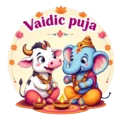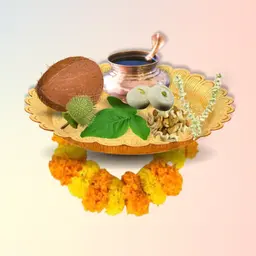
Description
The sacred island of Omkareshwar, shaped like the divine “ॐ (Om)” symbol on the banks of River Narmada, is home to one of the 12 Jyotirlingas of Lord Shiva. It is here that devotees from across India and the world come to offer the powerful ritual of Ashtmahabhent — the eight supreme offerings made to Lord Shiva to seek blessings, protection, and liberation.
Performing the Ashtmahabhent at Omkareshwar Jyotirlinga is not just a ritual; it is a deeply transformative spiritual experience.
What is Ashtmahabhent?
"Ashta" means eight, "Maha" means great, and "Bhent" means offering or gift.
So, Ashtmahabhent is the ritual offering of eight sacred items to Lord Shiva, each carrying deep spiritual symbolism. These offerings represent the surrender of body, mind, ego, and desires, and the invocation of divine purity, peace, and enlightenment.
Why Offer Ashtmahabhent at Omkareshwar Jyotirlinga?
Omkareshwar Jyotirlinga is believed to be a living form of Shiva’s energy. The sanctity of this temple is heightened during Shravan month and on Shivratri. Offering Ashtmahabhent here:
-
Amplifies your prayers due to the divine vibrations of the Jyotirlinga
-
Removes doshas such as Kaal Sarp, Pitru Dosha, Graha Shanti issues
-
Grants wish fulfillment in areas like marriage, career, health, and moksha
-
Cleanses karmic baggage and elevates spiritual consciousness
The 8 Divine Offerings in Omkareshwar Ashtmahabhent
1. Jal (Water)
Symbolizes purification, surrender, and washing away past karma. Devotees offer Narmada Jal or Ganga Jal.
Mantra: “Om Namah Shivaya”
2. Bilva Patra (Bael Leaves)
Represent the Trimurti and Shiva’s three eyes. A must-have offering in any Shiva Puja.
Mantra: “Om Bilvapatraya Namah”
3. Dhatura (Datura Fruit/Flower)
Though poisonous, it is dear to Shiva, the Neelkantha. Represents conquering negativity and fear.
Mantra: “Om Daturaya Namah”
4. Bhasma (Sacred Ash)
Signifies renunciation and the truth that all material things turn to ash.
Mantra: “Om Bhasma Bhushitaya Namah”
5. Sandalwood Paste (Chandan)
Soothes and cools the Shivling. Represents mental calmness and divine fragrance.
Mantra: “Om Chandan Lepitaya Namah”
6. Milk (Doodh)
Pure and nurturing, offered to show love and devotion. Also enhances the aura of the devotee.
Mantra: “Om Ksheerabhishekaya Namah”
7. Honey (Madhu)
Represents sweetness and humility. Attracts divine grace and blessings.
Mantra: “Om Madhuraya Namah”
8. Panchamrit
A holy mixture of milk, curd, honey, ghee, and sugar — symbolizes unity of the five elements and bliss of divine nectar.
Mantra: “Om Panchamritabhishekaya Namah”
How to Perform Ashtmahabhent at Omkareshwar
Items You’ll Need:
-
Narmada Jal / Ganga Jal
-
Bilva leaves (fresh and unbroken)
-
Dhatura flower or fruit
-
Vibhuti (Bhasma)
-
Chandan (sandalwood paste)
-
Raw milk (preferably cow milk)
-
Pure honey
-
Fresh Panchamrit
Ritual Steps:
-
Bathe in the Narmada River before visiting the temple (if possible).
-
Buy or carry the 8 offerings in a clean Puja thali.
-
At the temple, wait for your turn to approach the Omkareshwar Shivling.
-
Offer each item with mantra chanting and heartfelt devotion.
-
Perform aarti, ring the bell, and meditate on Shiva’s form.
Best Time to Perform Ashtmahabhent at Omkareshwar
| Occasion | Why It's Auspicious |
|---|---|
| Shravan Somvar | Shiva’s sacred month – most powerful day |
| Mahashivratri | Shiva’s cosmic wedding night |
| Nag Panchami | Serpent blessings with Dhatura & milk |
| Pradosh Vrat | Bi-monthly fast to wash away sins |
| Kaal Sarp Dosha Puja Days | Highly recommended for remedy seekers |
Spiritual Benefits of Ashtmahabhent at Omkareshwar
| Offering | Spiritual Effect |
|---|---|
| Jal | Purification and surrender |
| Bilva | Removal of sins and peace of mind |
| Dhatura | Elimination of inner poisons (anger, fear, ego) |
| Bhasma | Awakens renunciation and self-realization |
| Chandan | Promotes serenity and divine aura |
| Milk | Emotional healing and devotion |
| Honey | Sweetness in relationships and karma |
| Panchamrit | Spiritual unity and divine nourishment |


